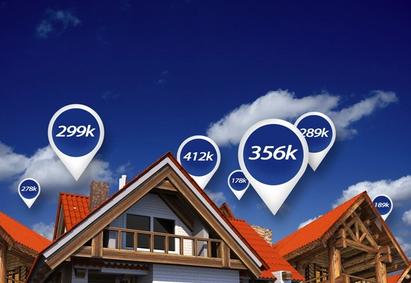How To Budget For A House
Written by:
Andrew Tavin
Andrew Tavin
Personal Finance Writer
Andrew Tavin a contributing writer for Own Up.
See full bio
Fact Checked by:
Dan Silva
Dan is the Vice President of Marketplace Lending at Own Up. Throughout his career, he has held executive leadership positions in the mortgage and banking industry.
See full bio

Keeping a budget may not be fun, but it is an important step toward meeting your financial goals. It's also a necessary first step if you're hoping to purchase a home. Purchasing a home is one of the biggest financial decisions of your life, so you’ll need to know how much you can afford.
Just as importantly, you're going to have to prove to a bank or other mortgage lender that you can afford a home loan and that you're going to be able to pay it back. This will require taking a look at your current expenses and income and seeing how much "room" you have for monthly home payments.
Your Personal Budget
Before you start looking for a house, you need to know what additional monthly costs you can manage. Generally, you should aim to spend less than 28% of your gross monthly income on housing payments. You can start by calculating your personal monthly budget to get a clear idea of how much you spend on everything else and what would be left to spend on a house.
That means adding up your current income and expenses. Then, subtract your expenses from your income to determine how much you have left over for your new house payments.
Household Income
When calculating your budget, be sure to use your net monthly income and not your gross monthly income. Net income is the number you're left with after your employer has taken out any taxes or benefit payments.
Take that number and add the regular net monthly income earned by everyone in your household who contributes to the family's expenses.
Now add any additional regular part-time or freelance income. Mortgage lenders may not use that extra money to compute your creditworthiness, but it definitely matters when you're figuring out your personal budget.
Finally, add in any other regular monthly income, such as social security payments or alimony payments.
Household Expenses
Now it's time to calculate your monthly expenses. Don't worry about housing expenses at the moment. We'll get to those later.
Likely expenses will probably include:
- Food
- Clothing
- Health insurance premiums and medical costs not paid by your employer
- Gas, electricity, and other utility bills (these may change when you buy a house, but you can use current numbers for now)
- Transportation, including car payments and gas and/or public transit fees
- Student loan payments
- Credit card and other monthly debt payments
- Personal items and recreation costs
- Charitable contributions
- Money set aside for an emergency fund
- Monthly after-tax contributions to investment or savings accounts
Some of those costs will be consistent month to month while others will be variable expenses. You can average out the less consistent expenses to come to a reasonable approximation of your monthly expenses across a year.
Breaking Down Your Payments
Down Payment
The down payment is money you allocate toward the home purchase prior to taking out a mortgage loan. Therefore, a larger down payment will mean a lower principal on your loan. Another bonus is that a larger down payment can lower the interest rate on your loan since this signals a lower level of risk to the lender. Given these benefits, we recommend making a larger down payment than the minimum required by your lender. One exception to this rule of thumb is if you don’t plan on owning the home for long: in this case, a high down payment might not make as much sense.
A conventional mortgage can carry a minimum down payment as low as 3% of the purchase price on your first home. Private mortgage insurance (PMI) will also be required if your down payment is less than 20% of the purchase price on a conventional mortgage. FHA loans carry a 3.5% minimum for credit scores of at least 580, with a 10% minimum for credit scores between 500 and 579. VA and USDA loans have no required down payment.
While a lower down payment might allow you to buy a more expensive home, this carries increased costs and greater risk. Instead, take the time to find your perfect home at a price point that meets your needs.
Closing Costs
Don’t forget about closing costs. These can be up to 5% of your principal and will include fees like loan origination fees and attorney fees.
Monthly Payments
When buying their first home, many people don't realize the full costs of homeownership.
First of all, there are the monthly mortgage payments you'll be making to the bank or mortgage company every month.
Those monthly bills will likely include:
- Loan payment. Conventional loans will be amortized, so a portion of the payment will be applied to both the principal and the interest.
- Property taxes. Mortgage providers will often collect real estate taxes to pass on to the government rather than leaving them to the borrower so as to avoid the risk of a lien.
- Homeowners insurance. Monthly insurance premiums are often, but not always, included in your mortgage provider's payment requirements.
- Private mortgage insurance. PMI is charged to borrowers who made small initial down payments or have lower credit scores. Federal Housing Administration loans also require mortgage insurance.
You can use a mortgage calculator, like Own Up's Rate Range Finder, to get an estimate of your potential monthly payments.
These calculators allow you to change the variables to estimate your monthly mortgage payments based on different home purchase prices, mortgage interest rates, down payments, credit scores, and property tax rates. You can ask your real estate agent, if you have one, about current rates or do your research online.
Now is a good time to revisit your current housing expenses, whether they be rent payments or mortgage payments.
Since you'll likely be moving out of your current rental property or selling your current home, you don't have to include your current housing payments when calculating your future housing payment.
“Hidden” Housing Costs
So you've calculated the monthly cost of a home at a certain price point. Now your budget is all set, right?
Almost. There are still some additional "hidden" ongoing costs you should factor in, even if only approximately, to your future monthly budget:
- Annual homeowners insurance premium. If your insurance payment is not included in your monthly mortgage payment, you'll need to account for it separately in your budget. The first year's premium is usually paid upfront, at the same time as closing costs.
- Maintenance. While some repair costs can't be predicted, it's worth researching what typical maintenance costs look like month to month for homes in the area you're moving to.
- Emergency fund. A new home doesn't come with lifetime guarantees. The water heater could break or the roof could start leaking. You should save money each month to be used for repairs and other unexpected expenses.
- Homeowners Association dues. If your new house is part of a co-op, you'll need to factor Homeowners Association fees into your regular payments.
While these hidden costs may not be exact, you should keep them in mind when calculating your budget so you aren't surprised after you've moved into your new home.
You'll also want to be sure you've saved some money for closing costs. These are the upfront costs, like downpayment and inspection fees, you'll need to be prepared for after your offer is accepted.
Looping in a Lender
While you may be confident in your budget calculations, mortgage lenders aren't going to just take your word for it.
Banks and mortgage companies use different formulas to calculate mortgage rates for your income level and financial situation. They'll look closely at your credit score, your full credit report, your debt-to-income ratio, and a number of other pieces of documentation.
Since you already took your time to make a housing budget, you've taken the essential first step in the home-buying process. However, before you start house hunting, you should apply for pre-approval with a mortgage lender.
Pre-approval is sort of like a test run for the mortgage approval process. A lender will review financial documents, like bank statements, and give you a letter letting you know an approximate mortgage amount you can be approved for. This will give you an edge when you do decide to make an offer on a home.
Do you have other concerns about buying a house? Check out our complete guide to the questions you should ask before purchasing a home.


